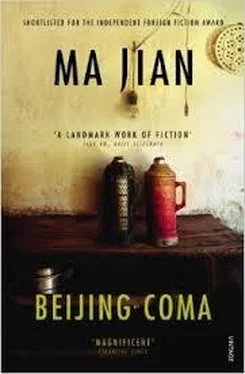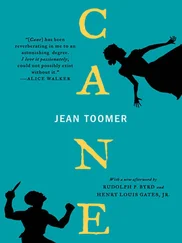‘Bet you were shitting yourself!’ I laughed.
‘He was a big brute of a man. He could have broken me in half with just one hand.’
‘Did Nuwa go with you?’ I imagined that if Nuwa had been there, she would have been shocked by his cowardice.
‘She went to a party at Jianguo Hotel,’ Wang Fei said sullenly. ‘It was some French guy’s birthday.’
‘Don’t waste your time being jealous,’ I said. ‘There’s nothing you can do. She’s surrounded by admirers.’ There was a sudden clap of thunder. The sky outside the window darkened.
Having heard that Old Fu had resigned from the Organising Committee, Ke Xi walked in and said, ‘I’ll take over as convenor during this march. When we get back, we’ll hold a meeting and have a proper election.’
Shu Tong didn’t look happy. I knew he wouldn’t approve of Ke Xi taking over the leadership.
As I’d expected, he said, ‘Given the current state of affairs, I’d like to hand in my resignation as well. I think you’ll do a better job without me. And besides, I was never elected to this post.’
The meeting quickly broke up. I was surprised that Wang Fei hadn’t objected to Ke Xi’s plan.
Sister Gao, Bai Ling and Mimi arrived with curtain poles and the banners we planned to attach to them.
Bai Ling told me that Tian Yi had a stomach ache and wouldn’t be joining the march, but that she wanted me to take great care.
The bright-red banners filled us with revolutionary fervour. Everyone grabbed an armband and slipped it over their sleeve. The ink characters on two of the long banners were still wet, so Bai Ling and I took them to the Triangle and hung them out to dry.
The waiting crowd drifted towards us. Some departments had prepared even larger banners than ours. Students everywhere waved their home-made pennants in the air. Ke Xi and Han Dan were both holding megaphones. Although I was head of security, it hadn’t occurred to me to buy myself one.
Han Dan got up and explained the rules of the march. He told everyone to stick to the official slogans. He said a girl at Xinhua Gate had shouted ‘Down with the Communist Party!’ as she was flung into a van, which gave the police an excuse to attack the crowd. He asked the students who’d turned up with bicycles to put them away and join the march on foot.
Then he handed me his megaphone and told me to say a few words.
‘You must walk in rows of ten,’ I said. ‘The stronger students should stand at the sides and hold up the banner-poles. Everyone else should hold hands so that no outsiders can infiltrate our ranks. Only students with ID cards can join us today. If you want to go to the toilet during the march, take a friend with you. There will be police everywhere.’ As soon as I paused for breath, Ke Xi raised his megaphone and shouted, ‘Fellow students! If the police try to block our path or cut us up, just stand firm!’
Then everyone sang the Internationale and set off for Qinghua University.
Mou Sen caught up with us on his bike, and told us that thousands of Beijing Normal students were waiting to join us when we reached their gates.
Local residents standing on the pavements applauded as we passed, and drivers who’d stopped at the intersections hooted their horns in support. Wang Fei and Yu Jin held up a bed sheet. Bystanders gazed at it in bewilderment, unable to understand the slogan GIVE ME LIBERTY OR GIVE ME DEATH! written in English across it.
The weather was not on our side. When we reached Qinghua University, it began to pour with rain. A voice blared from four loudspeakers attached to the roof of a jeep parked outside the main gate: ‘Beijing University students, if you want to demonstrate, go back to your campus! The Qinghua students are attending lectures and don’t want to be disturbed.’
A few people inside the dorm blocks opened their windows and looked out through the driving rain to see what was going on.
Ke Xi said, ‘All the Qinghua activists have gone to the Square. The students who’ve stayed behind are conformists. They wouldn’t dream of coming out onto the streets with us.’
‘Shall we storm their campus gates?’ Chen Di said, walking up to us. He was pleased to be wearing his binoculars around his neck again, and to be leading the slogan-chanting.
Turning his back on Ke Xi, Shu Tong said to Han Dan, ‘No, let’s see if the Politics and Law University will join us. Mou Sen, cycle over to your campus and tell your classmates we’re going to be a bit late.’
So we headed for the Politics and Law University, and sent Shao Jian ahead to warn them we were coming.
When we reached the main gates, the rain became torrential. Many of our marchers ran off to seek cover in the shops lining the road. But the Politics and Law University students remained stoically at their gates waiting to welcome us. It was like the military forces of Zhu De and Mao Zedong uniting on Jinggang Mountain to form the Red Army. They told us to go and warm up in the canteen, where there was food waiting for us.
The leader of the Politics and Law University’s Organising Committee was a good friend of Liu Gang’s. He advised us not to march in the rain.
I was wet and cold, and wanted to go back and see Tian Yi. Yu Jin and Chen Di also said they’d like to return to the campus. Now that we were sitting comfortably inside the canteen, the idea of marching through the rain again wasn’t appealing.
‘The government will laugh at us,’ Zhuzi said gloomily.
‘We can’t turn back halfway!’ Ke Xi said, knitting his brows. ‘There are thousands of students waiting for us at Xinhua Gate and Tiananmen Square.’
Shu Tong didn’t want to give up either. ‘If we stay here any longer, the marchers will lose motivation. Let’s push on while our spirits are still high. As head of security, Dai Wei, and a member of the Organising Committee, you must comply with the will of the majority.’
Han Dan came over and said that he was going to head off alone to the Square to read out an open letter, and that he’d wait for us there.
I pulled out the note from my pocket, and told Shu Tong that Old Fu had advised me to abort the march if our numbers dwindled.
I decided that, whatever anyone else said, I wasn’t going to march in the rain, so I put on my wet jacket again and went back to the campus with Chen Di.
You’re wrapped inside a body that you can’t see, a prisoner in a jail you can’t touch.
A cold snowflake falls onto my face. My mother has left the door open. Two chickens have scuttled in, and are pecking at the ground near my bed. Last night, when everyone in the building was asleep, my old dorm mates Mao Da and Zhang Jie carried me out of the flat on a stretcher, put me in the back of a taxi and brought my mother and me to this shack in the outskirts of Beijing. I never paid them much attention in the dorm, so it’s surprising that now, of all my friends, it is they who have come to help me.
I hear Mao Da walking towards the door, saying to my mother, ‘It’s all arranged. You can take him in tomorrow morning…’
He and Zhang Jie shoo the chickens away, shut the door, then lift up my camp bed and move it next to the window. I can smell the wood shavings and rotting cabbage leaves lying in the corner of the shack.
‘Did you speak to that Dr Liang again?’ my mother says.
‘Yes. He asked whether Dai Wei has had oxygen treatment before. I had to say he had, otherwise they would have needed a signature from the hospital’s director. Things are very tightly controlled now. Any doctors found guilty of treating victims of the crackdown are immediately sacked from their jobs.’
‘We’ve paid for a two-week course for Dai Wei,’ Zhang Jie says. ‘It only cost three hundred yuan. It’s called high-pressure oxygen treatment. It uses the latest technology. They’ll push him inside a big oven-like machine then use shock waves and electromagnetic waves to stimulate his brain cells and improve his body’s immune system.’ These are almost the first words Zhang Jie has uttered since he and Mao Da picked us up last night. I remember how, in the beginning, his quiet and reserved demeanour led everyone in the dorm to suspect him of being a spy.
Читать дальше












